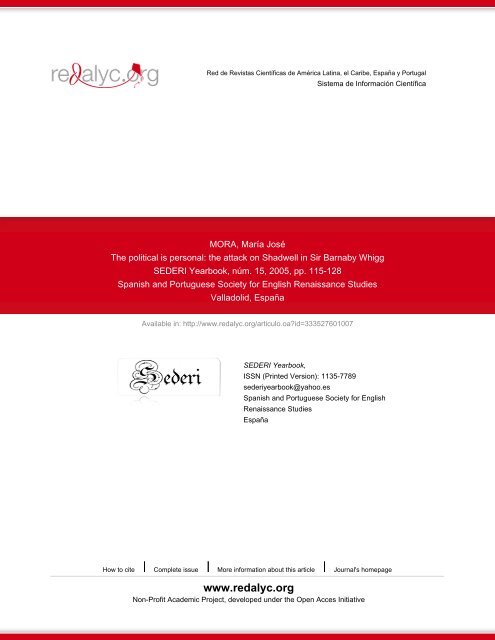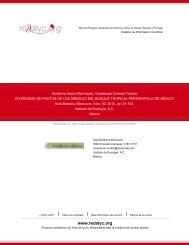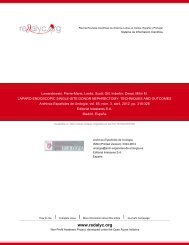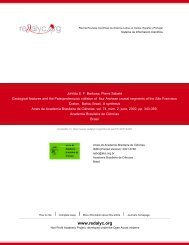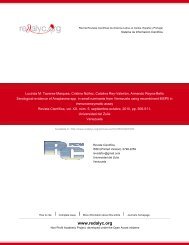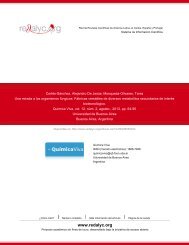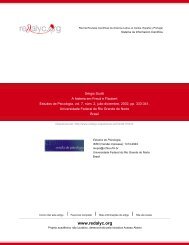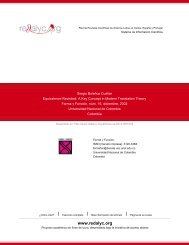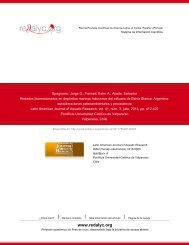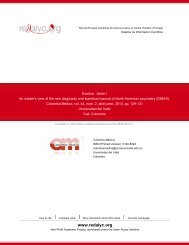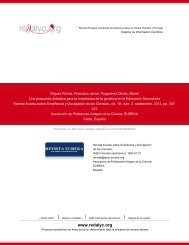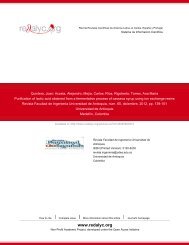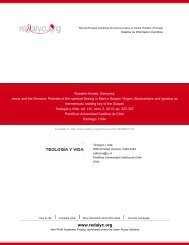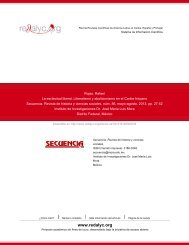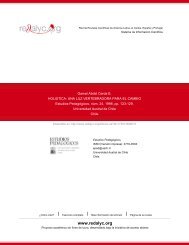Printed - Redalyc
Printed - Redalyc
Printed - Redalyc
You also want an ePaper? Increase the reach of your titles
YUMPU automatically turns print PDFs into web optimized ePapers that Google loves.
Red de Revistas Científicas de América Latina, el Caribe, España y Portugal<br />
Sistema de Información Científica<br />
MORA, María José<br />
The political is personal: the attack on Shadwell in Sir Barnaby Whigg<br />
SEDERI Yearbook, núm. 15, 2005, pp. 115-128<br />
Spanish and Portuguese Society for English Renaissance Studies<br />
Valladolid, España<br />
Available in: http://www.redalyc.org/articulo.oa?id=333527601007<br />
SEDERI Yearbook,<br />
ISSN (<strong>Printed</strong> Version): 1135-7789<br />
sederiyearbook@yahoo.es<br />
Spanish and Portuguese Society for English<br />
Renaissance Studies<br />
España<br />
How to cite Complete issue More information about this article Journal's homepage<br />
www.redalyc.org<br />
Non-Profit Academic Project, developed under the Open Acces Initiative
The political is personal:<br />
th e attack on Sha dwell in Sir Barnaby Whigg<br />
Ma ría José MORA<br />
Lillillersity of Seuilu:<br />
ABSTRAer<br />
TI1e paper discuses tite importance of personal satire in the<br />
Restora tion plays of the Exclusion Crisis (1679-82), focusing on<br />
Tho mas Ourfey 's Sir Bnmn by W/ligg (1681). Although the caricature<br />
of the poet Thomas Shadwell in the figure of Sir Bam aby has been<br />
generally recognized, recent discussions o f the play have tended to<br />
downplay its reso nance and emphasize instead more general<br />
aspects of the political satire on the \Vhig party. However, the<br />
pol itical element in this comedy is nol central lo the plo l; iI is<br />
inlroduced mainly through a secondary character, whose main<br />
function in the play seems lo be only lo mock a rival poet who had<br />
made no sec ret of his commitmen t to the wh íg cause . Sínce Sir<br />
Samal1}! Wltigg was produced soon after the defeat of the<br />
Exclusionisls, Ihe attack on Shad well seems almost an afterthc ught,<br />
an addition designed to increase topi cal interest - on the wake of<br />
the controversy provo ked by 17JCLancnshirc Witchcs - and lo arouse<br />
par tisan supparl for the play.<br />
0 11 the wa ke of the anti -Catholic paranoia triggered by the Popish<br />
Plol (1678), England wen l through a period of a cu le political crisis:<br />
in 1679, the faction that around thi s lime carne lo be ca lled th e<br />
Wh igs in lroduced the firs l of three succ essive bilis lo excl ude lhe<br />
Ca tho lic Duke of York from the succession; bul the Kin g<br />
manceuvered lo frustrate their aim s, drawing on the s up porl of the<br />
so-called Tories and resorting to his prerogative to prorogue or<br />
dissolve Parliam ent.' But political controversy was not restricted to<br />
parliarnentary debale: it ex lended lo th e s lreels and popular<br />
meeting p laces, like clubs and coffee-houses, Th e thea tres also<br />
engaged actively in the political slri fe. Plays like Bancroft's The<br />
Trngedy of Sertorius (1679), Se ttle's Tite Feinole Prelate (16&) or<br />
Shad well's Tite Lancasttire Witcltes (168 1) at tacked Popery and<br />
1 Fora ccncee account oí the Exclusi ón Crisis, see for instance Harrt s (l 99Y &:>-11 6).<br />
it; ,¡"'ri '5 (2005: pp."5-28)
endorsed Whig ideals. Tory poels relalialed wi th works that<br />
denounced rebellion and exalted loyalty, like Tate's Tlte Loynl<br />
Gel/eral (1679) and The History of Kil/g Richan: tlte Secol/d (1681/82),<br />
Whilaker's The Conspimcu (1680), or Dur fey's The Roynlist (1682);<br />
once the Exclusior rists were de fea ted in 1681, the Whigs w ere<br />
mercilessly ridi cul ed in plays like Behn's Tlte Roundheads (1682) or<br />
Crown e's Ci/y Politioues (168) .<br />
One of the firsl comedies lo make comic capital of the<br />
Wh igs was 1110mas Durfey's Sir Bnm nby Wlligg, produced by the<br />
King 's Companv in October 1681. The play presen ts severa] love<br />
intrigues agai nst a background of plots and conspiracies w hich<br />
provides the occasion for ab un dan t mockery on the Wh igs nnd ,<br />
more particularly, a carica ture of 1110mas Shadwell in the tiLlecharacter:<br />
Sir Barnaby, a mem ber like Shadwell of the Wh ig Green<br />
Ribbon Club, is presented al the beginning as a loud -mout hed<br />
radical rebel :' but a l the first sign o f danger he tu rns his coat and<br />
betrays .1 11 his former friends. Although the identi fica tion between<br />
Sir Barnaby and Shadwell is generally rccognizcd , stud ics of thc<br />
theatrica l production of the Exclusi ón years - Roper (1989), Owen<br />
(199) , ' 996) - have d ownplayed the imporlan ce of persona l sa tire<br />
in the plays, arguing that such " particu la ris t approa ch" obscures<br />
the po litical sign ificance of the themes and tropes used by the po ets<br />
and "refuses lo acknowledge the bigger picture of drama tic and<br />
politícal shifts" (Owen ' 996: 27). In this line, Susan Owen reads Sir<br />
Bnm nby Wlligg as "a par tisan play, a Tory satire on the Whigs" in<br />
wh ich there are "sorne specific jibes a t Shadwell" (1996: '94)' Bu t<br />
the weigh t of these "specific jibes" needs lo be reassessed : the<br />
celebration of Tory triumph and ridiculing of the Whi gs are nol - as<br />
they are in Durfey 's subseq uent comedy, Tite Roynlist (1682) - part<br />
of the fabri c of the wo rk: in Sir Bnmnby, the who le subs tance of thc<br />
poli tical sa tire revol ves upon an element that is largely extraneous<br />
lo the plot: the carica ture of the riva l po et.<br />
It is true that the characterization of Sir Barna by borrows<br />
elemen ts frequently usen in anti-Whig propaganda , w h ich 15 not<br />
1 The Creen Ribbon Club had begun mee ting C.I6¡S at the Kmg's Head Tavern at<br />
Chancery Lane End . The Club was tho ught te be responsible for the Exdusionis t<br />
periodical A Wwkly PIlCqllrl (J! Aill'irl" [ mm Rt J1I/t:' and for the d tstrfbutíon o f ' ....'hig<br />
propaganda thrc ughou t the country. It also ccllabora ted in rhe organiza tion of the<br />
pope-burmng processíons held on the anmversary of the accession of Queen<br />
Ehzabeth (17 Nove mber ). See Harris (l99 J 84-8S)·<br />
116
surp nsmg if we bear in mind that Shad well was one of the<br />
playwrigh ts more closely associated with the Whig cause. Thus, Sir<br />
Barna by is defined in the Drnmntis personac as na Phanatical Rasca},<br />
one of Oliver's Knighls; one that always prelends to fear a change<br />
of Covem men t yet ci nes his best to cause O TlP . " ) Resides indicntin g<br />
the author's contempt for the cha racler (idenrified as a "rasca)" ), thc<br />
description d raws on the connn on partisan trope of presen ling the<br />
Whigs as the re-incarnat ion of the Roundheads, and associating<br />
them , therefore, wirh the ghost of the Civil War and the puritan<br />
republic; it also presents their professions of lovalism - their<br />
defen ce of English law and liberty - as hypocrit ical, iden tifying<br />
them w ith the spirit of sed ition. Th is portrait comes lo life as soon<br />
as Sir Bamaby makes his firsl appea rance on slage. He speaks wil h<br />
nosla lgia of "the blessed year of 48" (11) and resorls lo puntan<br />
rhetoric as he refuses lo kneel and bare his head lo drink the king's<br />
health: "Not I Sir, yo u musl spare me: I never kneel (not 1) but lo<br />
pray ... Sir, we never uncover, 'tis not OU T method; we never use<br />
any Ccrcmony" (11). His anti-monarchical stance rcndcrs him a<br />
trailor in the eyes of the other cha racters:<br />
SIRBA R~ABY : ... 1knew your Father long ago, M,. Wildíng; he was<br />
always a free, generous soul índ eed - but (betw íxl you and 1)<br />
would not be rul'd: he wou ld still be on the wrong side : Come,<br />
come, he 100"d the King too well: had he not lov'd the King, he<br />
had been a brave felIow.<br />
B ~ED I CK: Otherwíse called a Rasca!. (9)<br />
Yet, Sir Bamaby identifies the Whig cause wi th the true national<br />
spirit, and speaks of his party as the only guaranlors of p roperty<br />
and freed om: "1 can lell you, that if OUT soul-saving Party do not<br />
settle the Nalion, I say 'tw ill crack, 'twill unhinge - whi p, you're<br />
gon,old An tichrisl will ha ve YO UT Lands and Bodies, and the Devil<br />
YO\IT sou ls " (10).<br />
Besides these commonplaces, other fealmes are added lo<br />
turn Sir Barna by into the prolotyp ical Whig of Tory partisan<br />
w riting . Thus, el central eleme n t in this cha rac teriza tion is the<br />
" Other characters wi thin the play corroborate this descríption o f Sir Bamaby. See,<br />
for insta nce, the first references to hlm in act 1:<br />
BENEDICK: Whigg is hisname? Oh, I believe I know him, a huge fat fellow,<br />
one of Olivet's Knights.<br />
WI L.OI NC:Th e sam e, and the most busie, seditíous Coxcomb alíve . (9)<br />
" 7
allusion lo the greed of the Whi gs. In the fírs t act of the play<br />
Wild ing poinls lo the Whig claim that " theirs is the Church<br />
Militant," bul observes tha t in fact "Money is both their Cod and<br />
King " (9); Sir Bamaby himself confirms this view of the Wh igs as<br />
he says that his so n l is " alw avs in th e heart o f the City - in<br />
Lumba rd street" (JO), the slreel where go ldsmiths and Illon eylenders<br />
had their shops. Ind eed , later on in the play he appears<br />
willing lo change his religion for moneyr' in a rder to milrry a rich<br />
Turk ish heiress, he agrees lo tum Ca tholic first, and even Muslim in<br />
the end :<br />
SIR BAR..'JABY: ... \Vell, wel1, since it can 't be help't, 1'11 tum Turk,<br />
man, [e w, Moor, C raec ian, any thing: Pox on't, I'Ie not lose a lady<br />
and such a sum for the sake of any Religión und er the Sun, by<br />
Mahomet, no t I.<br />
SWIFT: Bul does nol yo ur Conscience prick you a Httle?<br />
SIR BAR.."I.JABY: Not a jot, faith. Why, you old fool, O UT Conscience is<br />
OUT lnterest always, and I have nol been a rebel so long SUTe lo<br />
have any squeamish fits al these years. (50)<br />
Sir Barna by, m oreo ver, associates h im sel f with th e corrup t practices<br />
and the manípulat ion of the London erowds attributed lo the<br />
Wh igs:'<br />
l'le go presently and corru pt my Men; some with bribes, some<br />
with promises and fair words, others with preferments: 'I'hen sow<br />
Sedition 'mongst the Mobile, win 'em with Pots of Ale, and Peny<br />
4 The aUusion to the change of re bgton may ind eed be a personal jibe at Shadwell. A<br />
few months after the performance of this play Shadwell was accused in a Tory<br />
pamphlet of being a "Papíst" and h3\' 11g been married by a "Poptsh pn est." His<br />
reply nppeared in J \\'hig publícation, 1711' ímpartíal Prolt'stllllt M",cllry (jan. 4 -27,<br />
1682); Shadwell reportedly denied lile accusa tion, though he admitted bavm g leaned<br />
" towa rd Popery for about etght Months (19 OI 20 Years síuce)." See Borgman (1m:<br />
55-56).<br />
s On the active t nvolvement of t he Londo n crowds in t he political strtfe of these<br />
years, see Harris 1987, esp. 1 5~88 . Although both Whigs and Torí es attempted to<br />
enltst the sllpport of the conunon people, the staunchly Protestant sympathies of the<br />
City mad e pro-wlug demonstrations much mor e consptcuous . Tory propagand a<br />
therefore accused the Whigs of cour ting the "rabble" and tnstígatíng rebelhon<br />
(Owen 1996: 149'"56). and ann-whtg plays often make this point; see, for íns tance,<br />
Lord Lambert's song in Behn's The RIlJ lt1l l}, t'(III~ (4.3-97-112), the Preface to Durfey's<br />
17w R(JYlllisl (1682), or the discovery of the "Tory" plot in Crowne's City Po/diques<br />
(+l.2S7-}I) ·<br />
118
Loafs, to com mít Ryots, Murders; there's your Polícy! J'le do't 1<br />
sayo(50)<br />
Whig paranoia, their chronic fear of plots and French in vasions, is<br />
a lso introduced in the caricature; thus Sir Barnaby is outraged to<br />
discover that his nephew, Sir Walter, has no weapons in the house<br />
to use in their own defence:<br />
SIR BAR'iABY: A eareless Villain - he shall nol own the blood of the<br />
Whiggs tha t neglecls his Counlrey thus: - ne'r a Musquel a Rogue<br />
- in this Popish Age too, and but one Sword, Ilay, and in a fam ily<br />
of sixleen People uprising and downlying - a Dog- a Rascal - bUI<br />
ene Swerd? ._. A Son of a \\'hore, ne'r a Dagger neither, nor a<br />
Case-knife sharp at end - nor nothing - not so much as a Penknife?<br />
(10)<br />
Creed, corrup tion, and coward ice are presented as the<br />
visible ma rks of a total lack of principIes. One of the gallan ls makes<br />
the point, as he says that Sir Barnabv will "in .111 turns of State<br />
ehange his Opinion as easily as his Coa t, and is ever zealous in<br />
Voting for that party that is mosl Powerful" (9). This impression is<br />
soo n eon finn ed. For a ll his ranting, Sir Barnaby is quiek lo defect<br />
frorn the Whig cause as soon as he believes there is real danger<br />
() .2); he nol only changes sides, bu l lum s in .1 11 his fonner friends:<br />
W ILDINC: ... The green Ribbon Club I find is now dispers'd: pray,<br />
where's yo ur late ftiend and brother Sir Miles Mutinous?<br />
SIR BARN A BY: IVhere? In Newgale.<br />
BENEDI CK: How! Newgale! IVho has Impeach't him?<br />
SIRBAR.'JABY: 1, 1myself, man: Impeacb't him! and more than that,<br />
intend to hang him the next Sessions .<br />
HD:EDICK: A fine, friendly, Christian-like Act, in troth.<br />
SIR BAR.\f ABY: Ay, Cad - friend or father in such a case: up they go<br />
to save my own neck: 1 don"t leve hanging, for my part - others<br />
mayo(40-41).<br />
Bul if these po inls may be comrnon in anli-Whig sa tire,<br />
there are other prominen t traits in the characterization of Sir<br />
Barnaby that are aimed particularly at Shadwell. Most conspicuous<br />
of them all is, obvíously, the character's physical size. Sir Barnaby is<br />
described in the pla y as "a big fat Iellow" (9) and he refers lo<br />
himself as "a Portly, ]olly, Fa t man: a ma n of Faith and Belly" (11).<br />
References to Shadwell's corpulence were a sta ple element in<br />
" 9
0 0 " He<br />
satirical a ttacks against hím: they would pursue him even after his<br />
death, as in the mock-epítaph wrilten by Tom Brown : " Heav'n, if it<br />
please, may ta ke his loyal Heart/ As for the rest, sweet devil, fetch<br />
a Ca rt" (Borgrnau 1969: 99). These allus ions often wenl logelher<br />
with jibes a l the poet's over-ea ting and , especiallv, drinking .<br />
Dryden, for instan ce, d evelops this image in the portrait of<br />
Shadwell as Og in the second par t of Absnlolll nlld Achit ophel (1682):<br />
Now stop your noses Readers, all and some,<br />
For here's a lun of Mídnight-wo rk lo come,<br />
Og from a Treason Tavern rowling heme.<br />
Round as a Globe, and Liqu or 'd e\" ry chink,<br />
Good ly and Creat he Sayls behin d his Link;<br />
With a 11 this Bulk there's no thing lost in Og<br />
Por e\"ryinch tha t is not Fool is Rogué."<br />
(Swed f'Tl be rB & Oea rinB '972 : 7;)<br />
Dmfey also makes the connection in this play; as Sir Barnaby<br />
expresses his d isI11c1Y that astrologers ha ve predicted el fam ine,<br />
Benedick observes: "This Epicu re I see never considers anything<br />
fur ther than the pleasures of eating and d rinking" (11). He<br />
reintrod uees the topic in the second act, when Wilding speaks with<br />
eonlempl of Sir Barnaby as "s woln and bloated " (19); this lime<br />
Dmfey exploils thc comic po tcn tial of this cha ractcr trai t, as Sir<br />
Barnaby takes offence and emphatically den ies wha t his physical<br />
presence on stage ma kes obvious: "1bloated ! what, because - I arn<br />
plum p, plump, a man of kidney or so - 1 bloated " (19). Dmfey<br />
insists again in act 5, as Sir Barnaby is accused of indulging in the<br />
sins of the flesh: "You are fu11 of sin, Son, Fat, fa1; \'ery Iat": he<br />
replies ind ignanlly: "Portly, portly, like the Ancien l British Race, a<br />
Vesse l of choice Wares, a Man of Kidney" (49)'<br />
Sir Barnabv also incorpo rales prom inen l fea tures<br />
associated wil h Shadwell's professiona l actlvity. He is presented by<br />
6 Dryden plays the same not e in his Vimlim tioll oftlte DI/ke {~· G ll j~ (1683): "Og may<br />
wríte against the King if he pleases. so long as he Drinks for him, end hís Wr itings<br />
will never do the Co ver nment so much harm , as his Drmking does it good: for true<br />
Subjects will not be m uch perverted by his Libels; but the w íne Duríes rise<br />
considerably by lus Claret 0 adds a mocking reference to the poet's fall al a<br />
popular tavem, The Old Devil: '11e broke no Ríbbs, because the hardness of the<br />
Stairs cou'd reach no Bones. and for my part, I do not wcn der how he carne to fall,<br />
for 1have always known him heavy : the Miracle ís, how he gOl "P agaín" (Dearing<br />
& Roper 1992: 32~30) .<br />
120
Wildi ng as "an audacíous and impudent libeller" (19) , allnd ing lo<br />
Shadwell's work as a pamphleleer for the Whig cause." Like<br />
Shadwell, he ta kes pr ide in his musical skills: "This fellow valúes<br />
himself exlremely by playing on the Musick" (10) , a commen t<br />
w hich seerns espec iallv sa rcastic coming fmm the pen o f a mas te r of<br />
song -writing such as Dnrfey." More no lorio usly, Sir Barnaby is<br />
made lo play a song that rid icules his theatrical pro d uction:<br />
Farew ell tny Lov'd Science, my fonuer deligh t,<br />
Moliere is quite rifled, then how sho uld I write?<br />
My fancy's grown sleepy, my quibling is don e;<br />
And design or invention , alas! I have naneo<br />
But still let the Town never d oubt my conditian;<br />
Though r fall a damn 'd Poet, I'le moun t a Musician .<br />
I go l Fam e by fil chin g from"<br />
Poems and Plays,<br />
Bul 111Y Fidlin g an d Drinking has lost me the Bays;<br />
Like a Furv I rail'd, Iike a Satvr 1writ,<br />
Thersites t;W Humour, an d Fleckno mv wu.<br />
But lo m"k~ some amend s for my snarlíng an d lashing,<br />
Idívert all theTown with my Thrummíng and Thrashing. (28)<br />
For all its brevi ty, the song is a thorough bash ing of<br />
Sha dwell as a poe!. Durfey clearlv makes comic capital of Drvden's<br />
infamous lampoon on Shadwell, as he porlray s Sir Bamaby as an<br />
incompetent playwright and associates him with Flecknoe." He<br />
allud es mockingly lo Shadwell's claim lo musical lalen l and lo his<br />
most successfnl comedy, TI/e Virluoso (1676), which Look the rise of<br />
70 n the pronunence acq uired by Shadwell as Whig pamphleteer in the early t680s,<br />
see Borgman (1969: 55).<br />
11 60th Shadwell and Durfey a ttached grea t importance to the use cf songs and muste<br />
in their plays, but Durfey's popularity in thís ñeld was unsurpassed . The DidiOlIllf)1<br />
of Nali01ll11 Biogm" IY allud es to an often quo ted anecdo te that "Charles 11 had leaned<br />
famil iar ly on his shoulder, holding a comer of the same shee t of music from wluch<br />
Dur fey was síngmg t he burlesqu e song.. ' Remember, ye whígs, what was fonnerly<br />
done.:" See aleo McVeagh (2000: 5) and Wheatl ey (2001 : )44).<br />
'1 M lcFlt'ck/Ult' was not published until October 1682, yet the poem had been written<br />
ell. 1678and had circulated in manuscr ipt (Swedenberg & Dean ng lCf72 : 299")00).<br />
121
the new experimen tal science as its cen tral theme." He also accuses<br />
h ím of plagiari zing, a jibe w hieh was com rnon in d isput es among<br />
poets; the a llusion to Mol iere in this cas e must have hit hem e, since<br />
Sha dwell ha d lifted seenes or w hole pl ots from him in severa ] of hi s<br />
ea rlv co rn ec{ies - TI", S/lII..II Loters (1668), TI", HYI'0crite (16(>9) TJ¡e<br />
Misa (1672) - and had taken pains in the Dedications of these plays<br />
lo d efend himself from sim ilar charges o f merely eopying from the<br />
Freneh poet." But the elemenl that Durfey seems lo ridicule rn ost<br />
poinled ly is Shadwell's identifica tion with the jonsonian m od el o f<br />
instructional sa tire: the comedy of humours, Th us, Shadwell's<br />
avowed purpose of exposing the vices of the tim e is transformed by<br />
Durfey inlo "snarling and lash íng" and railing "like a Fury" : m ost<br />
poinLed ly, his role as a sa liris t is presen ted, wilh a ve ngeance, as h ís<br />
"hum ou r" - that is, the "bias of the mind" (lo use Shadwell's 0""<br />
words) that makes a cha racter a coxcom b." To round o ff the<br />
caricatu re, this sa tirical humour is identified with the character o f<br />
Th ers ites, the clownish and q ua rrelsorne troublemaker in T J¡.. l liad<br />
who is takcn lo task by Odysseus for his ínsolcncc in abusing thc<br />
Greek lead ers.<br />
11,e relish wilh which Durfey hea ps ridicul e on Sha dwell 's<br />
poetic agenda clearly smacks o f more than political rivalry, Indeed,<br />
as Derek Hughes (1996) has poin led ou t, Durfey may have had<br />
sorne sco res lo se ttle with Shad we ll, w ho had pilloried him and his<br />
d ramatic prod uction in A Tril" Wino1V (1678). Shadwell had<br />
in lrod ueed in this play the cha racter of Yonng Maggot, described as<br />
"a n lnns of Cou rt-Man , w ho neglects his Law, and ru ns mad aft er<br />
Wil, prelending much lo Love, and bo th in spighl of Natu re, sinee<br />
10 There are other jíbes at the expense of t his play. Sir Barna by occastonally<br />
tncorpo ra tes by-word s characten snc of Sir Sam uel Hearty in '11k' Virtuoso, such as<br />
"písh", "whip" or " íucr", Sir Walter aloe introd uces a conuc echo of this play as he<br />
threa tens lo kill Townly, telling lum to prepare hiruself vto be dissected, ana tonu zed<br />
like a Chíchester Cock-Lobster, or so" (2 ) . On the dissection of the Chiches ter cock<br />
Iobster , see 1711" Virtuoso 1 .1.118-19, 1.1 . 247-48 aud 2.2.28) (Prieto- Pablos et sl. 1997).<br />
II Shadwell rephed te accusa tions of plagtarí ztng r...Ioliere in the dedícations te 111t'<br />
SIIJ1t''' [,mlt'rs and 111e Mj~ r . 111t' JlYl lf.lCrite apparently did not succeed on stage and<br />
was never pubhshed.<br />
u In the epilogue to J11t'H I I11 /(1 r i~ s (16]"1 ) Shadwell d efined Humour as foll ows: ..A<br />
Hum or is the Bvas of the Mind , I Bv which with violence ' lis one wav ínclin'd : l it<br />
makes our Actions lean on one side'stíll, I And in a l1 C hanges that \~ay bends the<br />
will" (Surnmers ' 927 1: 254)' Shad well d efended the use o( humours in comedy in<br />
the dedications to most of his plays, beginning with 171t" SI/IIt·u 1 ~ 1l lt'r s , and 171t'<br />
J11I/11f1rists.<br />
122
his Face makes h ím un fit for one, and his Bra ms for the other"<br />
(Sununers y 287)' Hughes contends tha t th is "obsessive poetast er"<br />
is a caricatu re of Durfey, "being sim ilar ly ugly, and ha ving<br />
sim ilarly deserted law for the pursuit of poetry" (1996: 221); he also<br />
observes tha t act '1 of A Trile iNMolO is set in the playhouse, whe re<br />
the characters watch a sex comedy which is "a malicious parody"<br />
of Durfey 's inunenselv successful A Fond HIIsbnlld (1 677)."<br />
Although Hughes is in good measure right, his<br />
obse rvation s can be further refined . The attack on Durfey is clea r<br />
bul his id en tification of Young Maggol wilh Durfey is debatable:<br />
Young Maggo t does not presen t himself as the au tho r of the play<br />
the cha racters attend in ac t 4, but as the poel's patron: the play, he<br />
says, is "one Pricketl 's, Poel Prickett " (y 334)." Inlereslingly<br />
enough, "Poet Prickett" is a nicknarne tha t was also associated w ith<br />
Durfey a few years later in a pamphlet criticiz ing his comedy The<br />
Mnrringe-Hnter Mntc/¡'d (1692)." As for the fragmen tary playwi<br />
th ín- the-play, it is clearly a parody of the sex eomedy which was<br />
in \'oguc in thc 16705. Although Sha dwcll may be aiming al scvcral<br />
works in this parodv, the action does resemble Durfey's A FOI1l!<br />
Husband in so rne crucial d eta ils: there are two lo vers cornpe ting for<br />
the favours of a m arried wom an, a husband who attempts to<br />
surprise his wife in the act, and a farcica l episode in which a lover<br />
hides under a table an d is discovered as the table is acc íden tally<br />
overturn ed . 111e table-episod e is especial1y signifiean l; Shadwel1<br />
uses il nol only lo ridicule Durfeys play - m aking nol one, bu t two<br />
" Contemporary sources agree on the success of A I~)//d J1usbmld. Langbame refers to<br />
this play as "one of [Durfey's] bes t Comedies," and notes that it had been<br />
"frequently acted wíth good App lause" (16g1: ISo). Downes observes that the play<br />
" took extraordinarily well" (1928: :;6), and Steele recorded that the comedy "was<br />
honoured with the pr(""...ence of King Charles the Second three of its ñrst ñve rughts"<br />
(71wGlIIlrtiiI11l, 15 juue 171)) .<br />
'4 It is true, hcwever, that total ccincidence is no t necessar v to make the caricature<br />
work. S had well's rítle-character in 111~ Viril/O...' does not fuÍly correspond to Robert<br />
Hooke; for one thing, Hooke was a prominent member of the Royal Society, whereas<br />
we are told in the play that Sir Nicholas was refused admissíon. Yer Hooke c1early<br />
saw himself personared in the comedy and , more stgntñcantlv, felt that e\'eryone in<br />
the eudience idenrified him with Sir Nicholas. See Pneto-Pablos rl 111 (1997: xxxiixxxí<br />
v).<br />
' 5 P llt'tll illfil1llis, or, A I..lrl IHlt ln,rth l/1wgi"S: Ilf'illg 11 ¡Jilllogw" llt'twt't'll LysI1111n Vlll f'lIt i"f',<br />
mili ,..Jrl J1rieket (1692). The title page attributes the authorship to Olarles Gildon. but<br />
this is questionable. Gildon had written a long commendatory Ietter ,...hich was<br />
publishe-d toge ther with the play.<br />
12)
lovers hide under the table - bu t also to highlight his contempt for<br />
Durfey's conception of comedy. In the prologue lo A FOI/tI HlIsbmul,<br />
Om fey had defended the preeminence of plot and design over wit<br />
and conversation:<br />
lf Plot and Bus'ness Comical and New ,<br />
Could please the Criticks that sit here lo view,<br />
The Poet mtght have thought this Play would do.<br />
But in this Age Oesign no praise can gel :<br />
You el)' it Conversation wan ts, and \Viti<br />
As if tite Obvious Rulesuf Comedy,<br />
\Vere on ly du ll Grimace and Repartée .<br />
Such, Sirs, have been your Darlings prov'd of late:<br />
The Author therefore careless of his Pete, <br />
And knowing Wit a Chattle hardly got,<br />
Has ventut'd his whole Stock upon a Plot. (1-11)<br />
Shad well obv iously had these lines in mind as he w rote the<br />
Dedication o f A T rile ~\'idmv. He is clea rly pointing to Durfey w hen<br />
he refers to "the Hule Poetasters of the fourth Tate" who hold "tha t<br />
Wit signifies nothing in a Comedy; but the putting out of Candles,<br />
kíckíng down of Tables, fallíng over [oynt-stools, impossible<br />
accidents, and unnatural mistakes, (which they 11105t absurdly call<br />
Plot) are the poor lhin gs they rely upon" (Summers 1927 3: 284)".<br />
There is a tradition abou t Durfey that holds that he was<br />
slow to take offence. The Dictionaru of Nntionnt BiogrnpllY, for<br />
inslance, claims tha t "he was ullerly devoíd of malice, his sa tirical<br />
spirit wa s mirthful and never revengefu l" and po ints out that when<br />
bitterly lampooned by Tom Brown in ' 689, he "made no angry<br />
rejoinder but took the abuse as a joke." In a recent s tudy of the poet,<br />
John McVeagh concu rs: "Du rfey took such ab use in his stride "<br />
,6 Christopher Wheatley finds in Shadwell and Durfey "li ttle personal amm us<br />
against each oth er." His conclusión is based on what he sees as "S had well's<br />
awareness that Durfev wa s beneath lum, not merelv in rank and aclríevement, but in<br />
terms of dramatic subjects. Shadwell wro te comedy , and Durfey frequen tly wrote<br />
the lowest subcategory of ccmedy , farce" (200 1: )44). But such awareness must have<br />
made the success of inferior dramatic forms all the more galling: A Trile Widllw<br />
fatled: A Fmul ll llsblllulremained a favourite.<br />
' 24
(2000: 14).'7 Yet, before he produced the carica ture of Shad well in<br />
Sir Bom oby Whigg, he had already singled ou l this poel among<br />
more prominen l Whigs in the sa tire Tite Progress o" HOllesly (1681),<br />
and would do so again in ScO/ulohm/ Mogllolllm; Or, Pot0l'ski's Cose<br />
(16fb), in which polirical
portends fulure successes, though sorne fat Whiggs of Sir<br />
Bamaby's tríbe made all the interest they could lo cry it clown.<br />
By introducing the caricature in the play, Durfey also<br />
capita lizes on the scanda l provo ked by Shadwe ll's The Lancashin:<br />
Witclles, slaged only a couple of mon ths before.' He cerlainly<br />
makes th e con necrion betw een hoth plays clear: Sir Rarnilht s<br />
family is associated with Lancashi re - his nephew, Sir Walter, is<br />
described in the Drnmmis perso1lal? as "an Opinionated Fool and<br />
Cuckold : A Lancashi re-Knigh t." If Shadwell used his play lo<br />
defend Whig ideals and a ttacked both the Anglican Church (in lhe<br />
character of the cha plain Sm irk), and Ihe Ca tholic (in Teague<br />
o'Divelly, the Irish pri est), Durfey ridicules his rival's s tance 1110 St<br />
effective ly as he makes Sir Barna by recant on stage, 111e scene in<br />
which the actor impersona Ling Shadwell appears d ressed as -81, that ts, from autumn 16& to<br />
sununer 1681; seeOwen 1
References<br />
Behn , A. 1996 (1682): T1Ie Rouudheods. T1Ie Works of !lp/lra Behu. Vo1.6. Ed. j.<br />
Todd . London: Pickering.<br />
Borgman, A.S. 1969: Thomne Slwdwd/ : His Lijc nnd Comedies. New York:<br />
Blom.<br />
Crowne, j. '967 (1683): Cily Po/itiql/es. Ed. j. Harold Wilson. London:<br />
Edward Am old .<br />
Dearing, V.A. and Roper, A. (eds .) ' 992: '111e Works of jollll Drvden, Vol. '4.<br />
Berkelev: Univers itv ofCalifornia Press.<br />
Dictionory oi Noííonol ' Biograp1ly 011 CD·ROM ' 995: Ox ford: Oxford<br />
Uníversity Press.<br />
Downes, J. 1928 (1708): Roscius Aug/icmms. Ed. M . Summe rs. London:<br />
Fortun e Press.<br />
Durfey, T. 1677:A Fond Huslmnd;or, TI/e Plotting S;slus. London.<br />
_ .1691: LolXfor MOlley;or, T1Ie Boarding Se1l001. London.<br />
_ .1682:T1Ie Royali'/ . London .<br />
_. 1682: Scandoíum Mngnatll1lJ; or, Potnpski's Case; A Satyr agniust Polish<br />
Opprcsion, London.<br />
_ . 1681: Sir Bamaby Whigg;or, No Wit Likca Womall 's. London.<br />
Harri s, T. 1987: London Crouxts in íhe Rrígn of Charles íl: Propaganda and<br />
Po/itics frolll the Rcstorntioll unííl 11u: Exclnsíon Crisis. Cambridge:<br />
Ca mbridge Un iversity Press.<br />
_<br />
. ' 993' Polities undcr 11Ie Latcr Stl/arts: Party Conflict in a Diuided Socie/y,<br />
1600- 1715. Harlow: Longman.<br />
Hugh es, D. 1996: EI/gli,1I Drama, 1660-'700. Oxford: Clarendo n.<br />
Langbaine, G. 1691: Al1 ACCOlll11 oflhe El1glish Dranunic Poels. London.<br />
McVeagh , j. 2000: Thomas DlIlfey and Restoratiol/ Drama: T1Ie Work of a<br />
Forgoncn Writer. Aldershot : Ashgate.<br />
Owen, S. J. 1993= "Interpreting the Politics of Restoratíon Drama." TI/c<br />
Scocnteeníh CClltury 8:67-97.<br />
_. 1996: Restorntioll Theaíre nnd Crisis.Oxfo rd: Clarendo n.<br />
Prieto-Pablos, j.A. et al. (eds.) ' 997' Thomos S1Iadwel/: TIIe Virllloso. Sevilla:<br />
Publicaciones de la Universidad de Sev illa.<br />
Roper, A. 1989: "Drawíng Parallels and Making Applications in<br />
Restoration l.iterature." Politics as Rej 1cctcd ;1/ Litcratllrc. Ed. R.<br />
Ashcraft. Los Angeles : \ViIliam Andrews Clark Memorial Líbrary. 29<br />
65·<br />
Summers, M. (ed.) '927: TIIe Complete Works of Thonms Shnduxll, London:<br />
Fortune Press.<br />
Swedenbe rg, H.T. and V.A. Dearing (eds.) '972: Thc Works of jolm D"!ldcll.<br />
Vol. 2 . Berkeley: University of Califomia Press.<br />
Van Lennep .l. (ed.) 1965: TIIe Loudon Slage: 1660- 1700. Carbonda le:<br />
Southe rn lI1inois University Press.<br />
lVilson, j. H. 1964: Mr. Coodmon, ttse Player. Pittsburgh : University 01'<br />
Pittsburgh Press.<br />
127
Wheatley, e j . 2001: "Who Vices Dare Explode ': Thomas Shadwell,<br />
Thomas Durfev and Didactic Drama ofthe Restoration." Ed. S. Owen.<br />
A Compon ían t~ Rceromuon Drama. Oxford: Blackwell. 340-)4 .<br />
128


